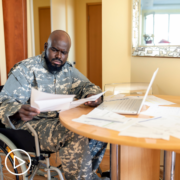Equitable Access: Overcoming Challenges in Precision Medicine for Veterans with Lung Cancer
Equitable Access: Overcoming Challenges in Precision Medicine for Veterans with Lung Cancer from Patient Empowerment Network on Vimeo.
Do veterans with lung cancer face barriers to precision medicine and targeted therapies? Expert Dr. Michael Kelley from Duke University School of Medicine discusses past and current access to precision medicine, the National Precision Oncology Program, and proactive patient advice to ensure you receive essential testing and optimal care.
[ACT]IVATION TIP
“…if you have advanced lung cancer, ask your provider, what testing has been done on my tumor, what are the results, and what does that mean for my treatment?”
Download Resource Guide | Descargar guía de recursos
See More from [ACT]IVATED NSCLC Veterans
Related Resources:

Do Disparities Exist for Black and Latinx Veterans Facing Lung Cancer? |

|

Navigating Lung Cancer Clinical Trials: VA Support and Resources for Veterans |
Transcript:
Lisa Hatfield:
Dr. Kelley, what specific challenges do veterans face in accessing precision medicine? And how can these challenges be mitigated to ensure equitable access to advanced treatments?
Dr. Michael Kelley:
So before 2016, the first cancer moonshot, there were major challenges in, not only in the VA, but across the country to access to precision medicine in the oncology field. We launched in that year, and if really now provide access to cutting-edge precision oncology technology, which is a lot of molecular testing and the expertise to be able to interpret the results of that test to apply it to individual patients. So I think we have advanced to the point where this should not be a barrier anywhere in the VA system, but I would say that only about half of veterans are enrolled for VA care.
And outside of VA there still are areas that have a variety of different barriers to getting the testing done on the tumor samples in a way which informs the treatment decision-making for patients. So this is very important. My activation tip for this is to be sure to ask your provider whether your tumor has been tested for molecular tests, and if so, what the results of those tests are, and how that impacts the treatment of your cancer.
Lisa Hatfield:
Dr. Kelley, can you speak to your research around barriers to prescribing targeted therapies for patients with non-small cell lung cancer with highly actionable gene variants, and what should patients and their care partners be aware of related to these barriers?
Dr. Michael Kelley:
So one of the key pieces of information that your providers need to know in order to, how to treat your advanced stage lung cancer is what are the molecular alterations in your tumor, and what types of proteins are expressed on the surface of the proteins that allows them to make good choices around immune therapy and another group of therapies called targeted therapies, and that can make major differences in your care and your outcome.
So when we first started using this type of testing, in particular the genetic testing of tumor samples, there was a lot of complexity in the results that was not well understood by the oncology providers, because it was new and very complex. So VA has instituted a program to provide that testing and the expert consultation service to be able to interpret those results.
And so when we set up that program, which is called the National Precision Oncology Program, we did a study, looking to see how many patients who should have gotten a targeted drug actually got that drug. And the results were similar to what has been reported in other healthcare systems. And that is, is that less than every patient was getting the targeted therapy, and it was about somewhere around a third of patients who did not get the therapy that would’ve been indicated by that test result.
So we wanted to know what the reasons were, and I think we’ve addressed a lot of the reasons that we came upon. A lot of it is education and making sure that the information from those tests gets to the provider and gets to the patient, and that comes with an understanding of what those test results mean. So my activation tip is, if you have advanced lung cancer, ask your provider, what testing has been done on my tumor, what are the results, and what does that mean for my treatment?
Share Your Feedback
Create your own user feedback survey










